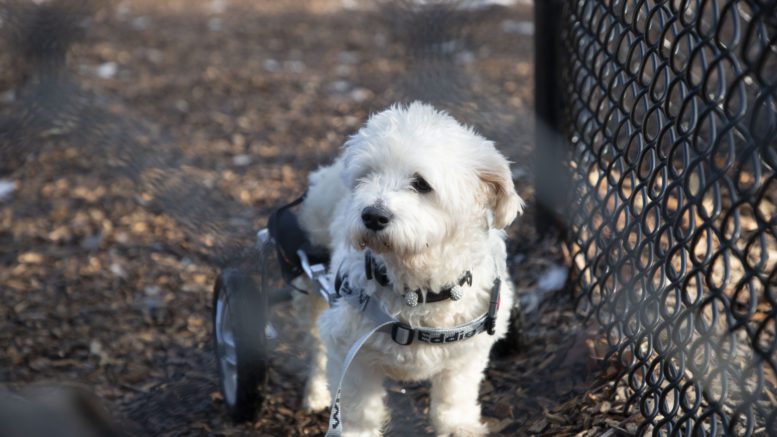In King City, Ontario lies a peaceful retirement home, decorated with beautiful Victorian furniture pieces against the backdrop of a rustic aesthetic. But instead of games and scheduled activities for the residents, there are bones and leashes.
Growing up with dogs in his life and passionate about animal welfare, Robert Scheinberg and his wife Danielle Eden founded the Dog Tales rescue and sanctuary in 2014. The couple is known to save abandoned or injured dogs and bring them back to their 50-acre property in King City. Along with the 130 dogs and over 80 horses roaming around the land, they have cats, chickens, and other farm animals.

Instead of a cage or a glass room, his wife decorated the dogs’ rooms with beds, painted walls, and photos.
“It’s a home away from home. She wanted to stay away from the typical shelters out there and make the dogs more comfortable around their surroundings,” he said.
Their team also rescues horses and donkeys from auctions. The couple keeps any dogs who don’t get adopted.
Scheinberg was also involved in creating Ontario’s new legislation for animal cruelty enforcement, which comes into effect Jan. 1, 2020. It’s a result of a March 2019 court ruling which found the Ontario Society for the Prevention of Cruelty to Animals (OSCPA) was acting unconstitutionally, due to a lack of transparency and accountability. The OSCPA had operated for 100 years, enforcing both the criminal code and provincial animal cruelty laws.
Scheinberg and his wife do not have the ability to investigate any animal cruelty cases, but they have experienced an increase in calls to help rescue dogs.
“We get more calls now… We’re more effected emotionally now because nobody’s really out there on the ground doing any work – or very minimum,” he said.
In December 2019, the Government of Ontario passed Bill 136 to replace the old system. The new law will add 100 government animal welfare inspectors, stricter penalties, and a new enforcement model. It is still unclear how much this new legislation will cost.
“Nobody ever questioned it, because all across Canada, including Ontario – until now, SPCAs do the animal welfare enforcement. It’s been a standard practice,” said Liz White, leader of the Animal Protection Party of Canada, in a phone interview. “This is a very good piece of legislation in the sense that animal welfare enforcement is no longer in the purview of a private charity.”
The OSPCA was contacted and declined to be interviewed for this story.
The government of Ontario was given one year to create new legislation. The OSPCA announced that it would stop handling enforcement as of June.
“Right now it feels like there’s a big void on who’s doing it [animal cruelty enforcement], I think they’re trying to get everything organized,” Scheinberg said.
Before the OSPCA’s summer deadline, the Ministry of the Solicitor General published a news release on May 17, attempting to clear up the confusion.
“The regulation enables affiliates of the OSPCA, such as humane societies, to continue enforcement should they wish to do so,” the release said.
The Ministry of the Solicitor General also created the Ontario Animal Protection Call Centre, an animal hotline for the public to use if there are concerns for an animal’s welfare. Ontario Provincial Police Inspector Paula Milne was appointed as new chief inspector to oversee animal cruelty investigations.
According to Brent Ross, a spokesperson for the Solicitor General, the call centre is overseen by the Ministry of the Solicitor General’s new Animal Welfare Services Unit. The help line is operated by a private company, Northern Communications. The Ministry established clear roles and responsibilities, including performance metrics which make the company accountable to the ministry.
“The call centre triages calls to the organization responsible for enforcing animal welfare based on the nature and location of the incident,” Ross wrote in an e-mail.
The hotline received close to 17 thousand calls since it opened in May 2019, and 80 per cent of the calls were related to animal welfare. The ministry was unable to provide the number of current active investigations.
To continue enforcement, humane societies in Ontario have to gain permission from the government. One of their most popular locations, the Toronto Humane Society, does not have any investigators. This location primarily runs as a shelter and provides foster homes, spay and neuter clinics, training services, community programs, and vaccination services. On average, over three thousand animals get adopted each year.
“Come January 1st, right now nobody really knows if the government will be ready and have its own inspectors,” said Jacques Messier, CEO of the Toronto Humane Society, in an interview. “They thought if humane societies still wanted to do it [animal cruelty enforcement] during this interim period then that will be okay. Otherwise there’ll be a big gap there where no one will be doing anything.”
On Oct. 29, Ontario’s Solicitor General, Sylvia Jones, introduced Bill 136 with specific roles and responsibilities for provincial inspectors. Some guidelines outlined in the bill are: all veterinarians must report any evidence of abuse, and animal welfare inspectors have the power to enter a home only with a permit or consent, unless there is reasonable grounds to believe that an animal is in critical distress. The Ontario Provincial Police (OPP) may also be called to assist animal welfare inspectors if necessary. As of January, Ontario will have the some of the harshest penalties across the country. The new legislation will include up to $1 million fines and up to two years in jail.
“I think the legislation that the government made at the moment is very good. This right now – for us – we think this is a good step in the right direction, and we’re happy to see it go that way,” Messier said.

